As a beginner photographer, choosing the right digital camera is one of your most important decisions. The right digital camera can be the difference between creating professional-level photos. There are several key things to take into account when picking the best digital cameras for beginners. For example, budget, size and weight, image quality, and features.
You may reduce your options by using your budget. But It is crucial to keep in mind you get what you pay for quality and features.
Additionally, size and weight should be important in your decision-making process. Portability should be a consideration if you plan to carry your camera around all day.
Finally, image quality should always come first when choosing a camera. And before making a choice, make sure to check reviews.
Now we will know the details about the best digital camera for beginners:
Contents
- 1 What Is A Digital Camera?
- 2 What Are The Different Types Of Digital Cameras?
- 3 Best 6 Digital Cameras For Professional Photography Beginners
- 4 What To Look For In A Digital Camera For Beginners
- 5 What Are The Factors To Consider When Choosing A Digital Camera For Beginners?
- 6 FAQs
- 7 Final Words | Best Digital Cameras For Beginners
What Is A Digital Camera?
A digital camera is a type of camera that records images and movies rather than using film. It comes in all sizes from basic models to high-end professional DSLRs. Digital cameras are CCD (charge-coupled device) or CMOS (complementary metal oxide semiconductor).
I’ll now talk about The Different Types Of Digital Cameras.
What Are The Different Types Of Digital Cameras?
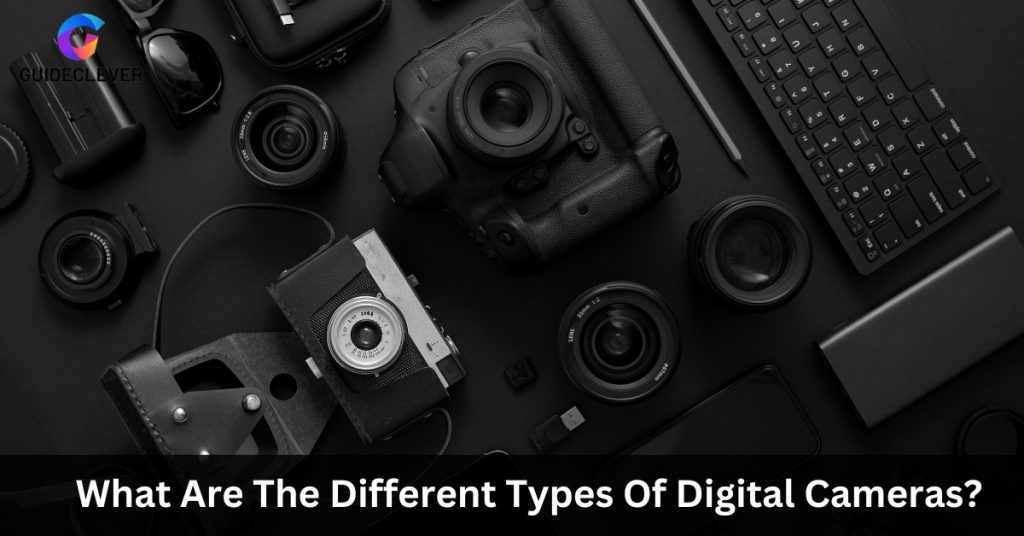
DSLRs (Digital Single-Lens Reflex Cameras)
DSLRs are top-of-the-line cameras used by professional photographers. They have interchangeable lenses, large image sensors, and high image quality. It also has many features and settings, making them the most versatile digital camera.
Mirrorless Cameras
Mirrorless cameras have the same features as DSLRs. But without a reflex mirror, allowing fast autofocus. They are smaller and lighter than DSLRs. Which makes them a good choice for travel or street photography.
Compact Cameras
Compact cameras are the most affordable and portable digital cameras. They are therefore a fantastic option for novices. They usually have fewer features than DSLRs or mirrorless cameras. But can still take high-quality photos.
Now we’ll next explain the Top 6 Digital Cameras for Novice Professional Photographers.
Best 6 Digital Cameras For Professional Photography Beginners
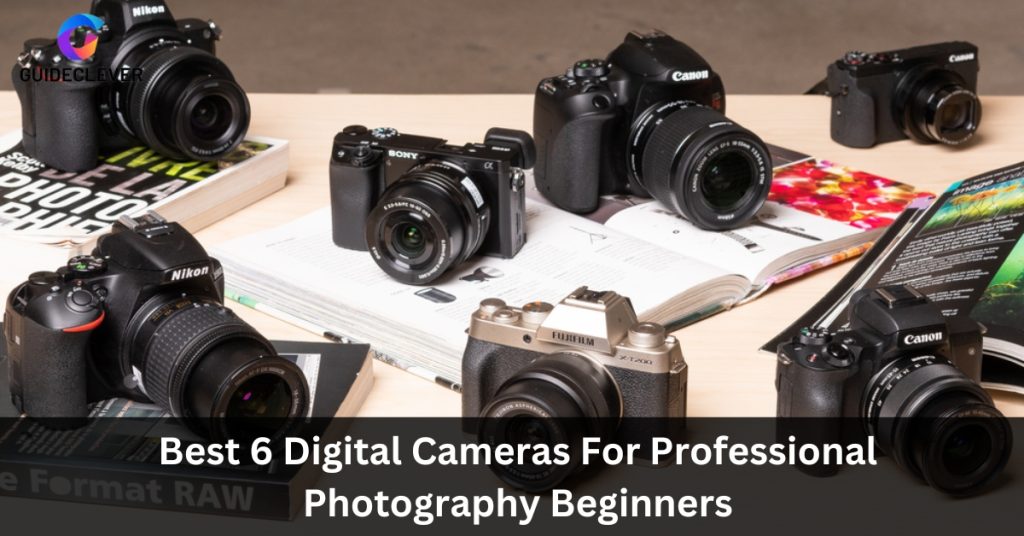
Canon EOS Rebel SL3
It is a great digital camera for professional photography beginners. It’s portable and light, making it simple to transport. It also has a 24.1-megapixel sensor, an optical viewfinder, and an articulated LCD.
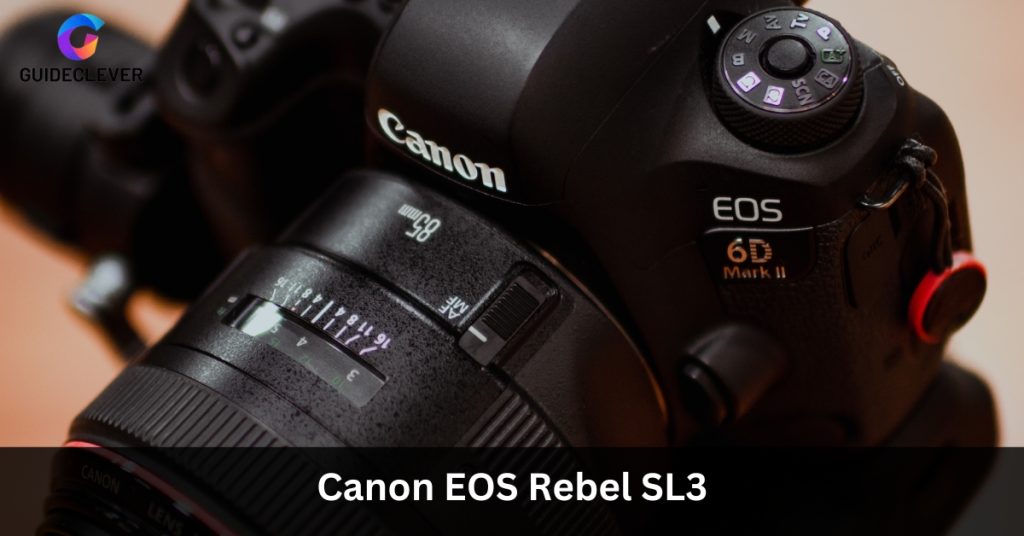
Specification
Sensor: 24.1-megapixel APS-C CMOS sensor.
Image Processor: DIGIC 8.
ISO Range: 100-25600 (expandable to 51200).
Autofocus System: Dual Pixel CMOS AF with 9 AF points.
Continuous Shooting Speed: Up to 5 frames per second.
Video Recording: 4K UHD at 24p and Full HD at 60p.
LCD Screen: 3.0-inch vari-angle touchscreen with 1.04 million dots.
Viewfinder: The viewfinder has an optical pentamirror and roughly 95% cover.
Connectivity: Wi-Fi, Bluetooth, and NFC.
Battery Life: Approximately 1,070 shots per charge.
Pros & Cons
Nikon D3500
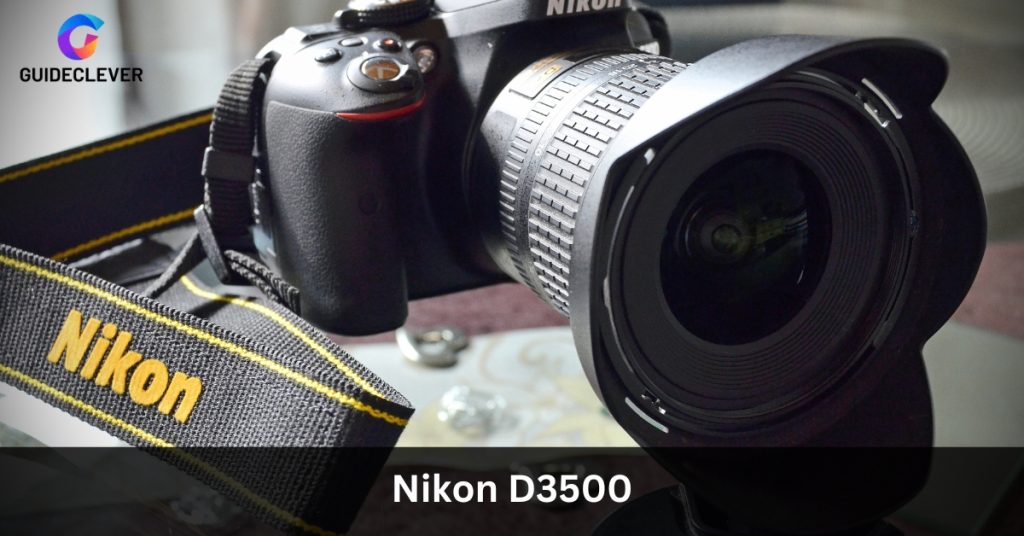
A fantastic entry-level DSLR for novices is the Nikon D3500. It has a 24.2-megapixel DX CMOS sensor and an optical viewfinder. There are also five frames per second for continuous shooting. Additionally, it offers 1080p video recording and Wi-Fi connectivity.
Specifications:
Sensor: 24.2-megapixel APS-C CMOS sensor (DX-format).
Image Processor: EXPEED 4.
ISO Range: 100-25600.
Autofocus System: 11-point autofocus system with a cross-type sensor in the center.
Continuous Shooting Speed: Up to 5 frames each sec.
Video Recording: Full HD 1080p at 60 frames per second.
LCD Screen: 3.0-inch fixed non-touchscreen with 921,000 dots.
Viewfinder: Viewfinder with an optical pentamirror and roughly 95% coverage.
Connectivity: Bluetooth for wireless image transfer and remote control.
Battery Life: Approximately 1,550 shots per charge.
Pros & Cons
Sony A6000
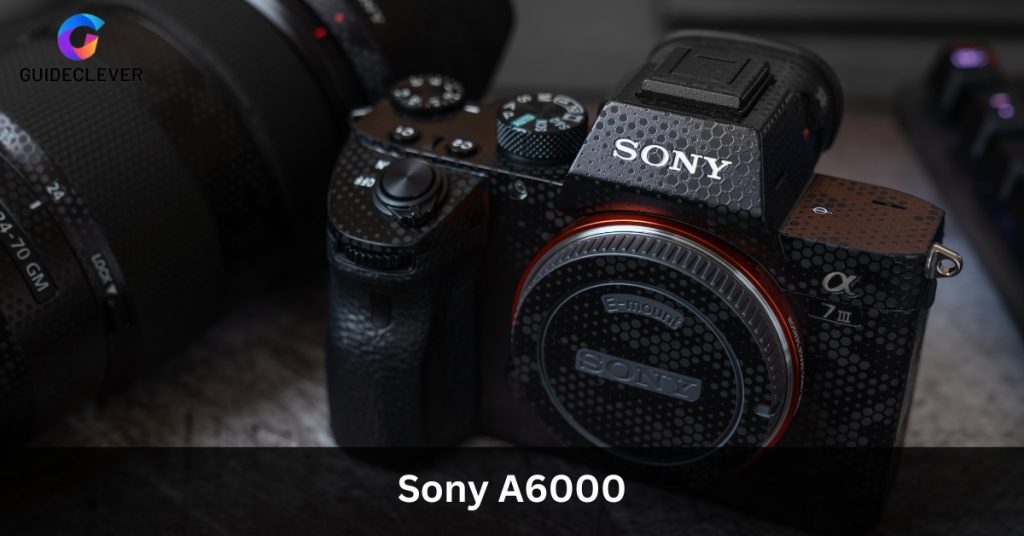
The Sony A6000 has a mirrorless camera with a 24.3-megapixel APS-C CMOS sensor. There is also an autofocus system that can track moving subjects in real-time. It can continuously shoot at 11 frames per second and record full HD movies at 60 frames per second.
Specifications:
Sensor: 24.3-megapixel APS-C Exmor CMOS sensor.
Image Processor: BIONZ X.
ISO Range: 100-25600 (expandable to 51200).
Autofocus System: Fast Hybrid AF with 179 phase-detection points.
Continuous Shooting Speed: Up to 11 frames per second.
Video Recording: Full HD 1080p at 60 frames per second.
LCD Screen: 3.0-inch tiltable LCD with 921,600 dots.
Viewfinder: Electronic Tru-Finder with approximately 100% frame coverage.
Connectivity: Wi-Fi and NFC for wireless image transfer and remote control.
Battery Life: Approximately 360 shots per charge.
Pros & Cons
Fujifilm X-T200
The Fujifilm X-T200 is a great digital camera for beginners. It has a 24.2MP APS-C CMOS sensor and an intuitive touchscreen LCD. It also has the latest X-Processor 4 image processing engine. With its advanced autofocus system, you can take high-quality photos with fast and accurate focus.
Specification:
Sensor: 24.2-megapixel APS-C CMOS sensor.
Image Processor: Fujifilm’s X-Processor 4.
ISO Range: 200-12800 (expandable to 100-51200).
Autofocus System: Hybrid AF with 425 selectable points.
Continuous Shooting Speed: Thirty frames each sec or as few as 8 frames per sec.
Video Recording: 4K UHD at 30 frames per second or Full HD at 60 frames per second.
LCD Screen: 3.5-inch vari-angle touchscreen with 2.76 million dots.
Viewfinder: Electronic viewfinder (EVF) with 2.36 million dots and approximately 100% coverage.
Connectivity: Wi-Fi and Bluetooth for wireless image transfer and remote control.
Battery Life: Approximately 270 shots per charge.
Pros & Cons
Olympus Om-D E-M10 Mark Iv
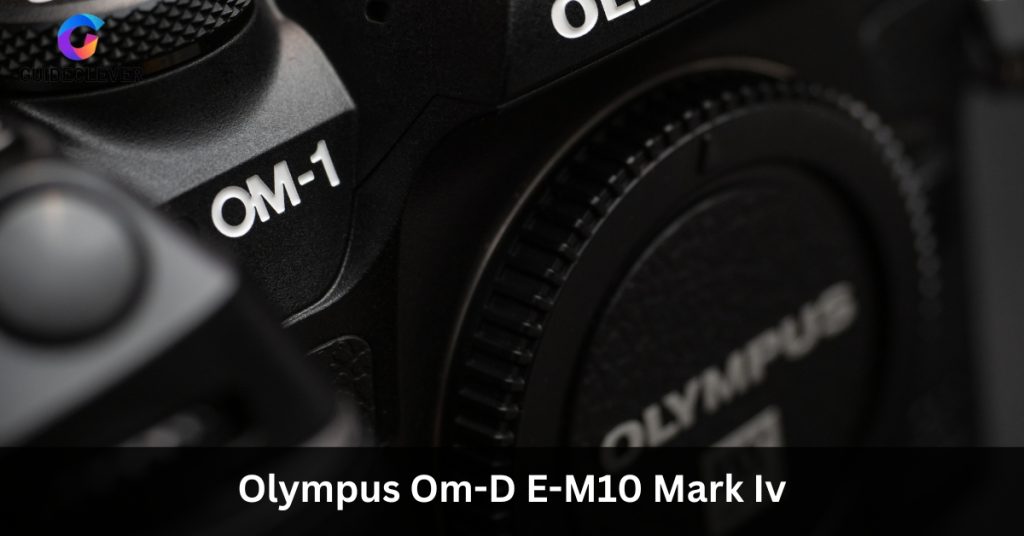
The Olympus Om-D E-M10 Mark IV is a great entry-level DSLR for beginners. It has a 20.1-megapixel Live MOS sensor and an OLED electronic viewfinder. It has continuous five-frames-per-second filming. Additionally, it offers 4K 30fps movie recording and Wi-Fi connectivity.
Specification:
Sensor: 20.3-megapixel Micro Four Thirds Live MOS sensor.
Image Processor: TruePic VIII.
ISO Range: 200-25600 (expandable to 100-25600).
Autofocus System: Contrast Detection AF with 121 points.
Continuous Shooting Speed: Up to 8.7 frames per second or 15 frames per second.
Video Recording: 30 frames per second in 4K UHD or 60 frames per second in Full HD.
LCD Screen: 3.0-inch tilting touchscreen with 1.04 million dots.
Viewfinder: Electronic viewfinder (EVF) with 2.36 million dots and approximately 100% coverage.
Connectivity: Wi-Fi and Bluetooth for wireless image transfer and remote control.
Battery Life: Approximately 360 shots per charge.
Pros & Cons
Panasonic Lumix G7
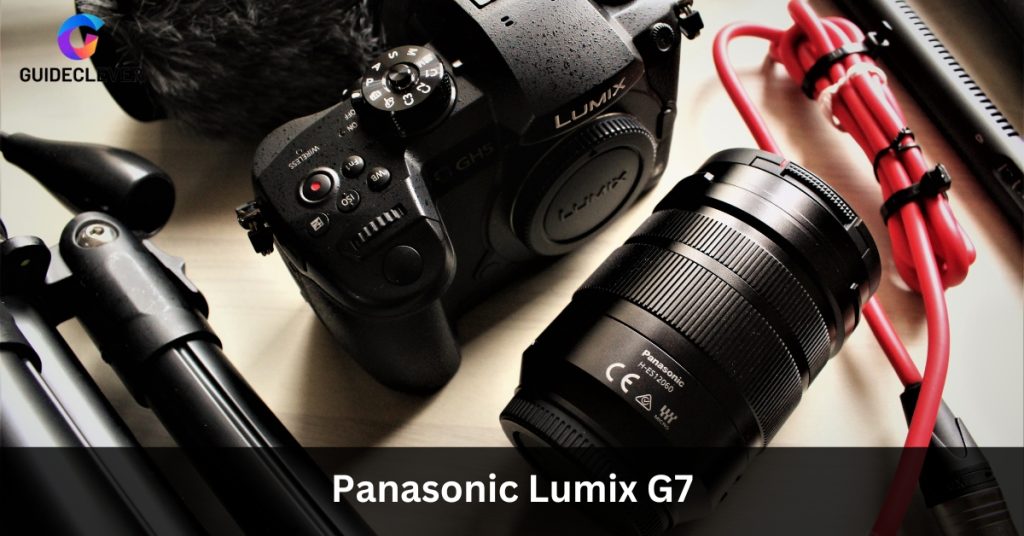
The Panasonic Lumix G7 is a great digital camera for beginners. It has a 16-megapixel four-thirds Live MOS sensor and a 3-inch LCD touchscreen display. Also has the latest Venus Engine image processor. Additionally, it offers 4K 30fps video recording and Wi-Fi connectivity.
Specification
Sensor: 16.0-megapixel Live MOS Four Thirds sensor.
Image Processor: Venus Engine 9.
ISO Range: 200-25600 (expandable to 100-25600)
Autofocus System: Contrast Detection AF with 49 points
Continuous Shooting Speed: Up to 8 frames per second or 40 frames per second.
Video Recording: Thirty frames each second in 4K UHD or sixty frames each sec in Full HD.
LCD Screen: 3.0-inch vari-angle touchscreen with 1.04 million dots.
Viewfinder: Electronic viewfinder (EVF) with 2.36 million dots and approximately 100% coverage.
Connectivity: Wi-Fi for wireless image transfer and remote control.
Battery Life: Approximately 360 shots per charge.
Pros & Cons
Now we’ll go into detail about what to look for in a digital camera for beginners:
What To Look For In A Digital Camera For Beginners
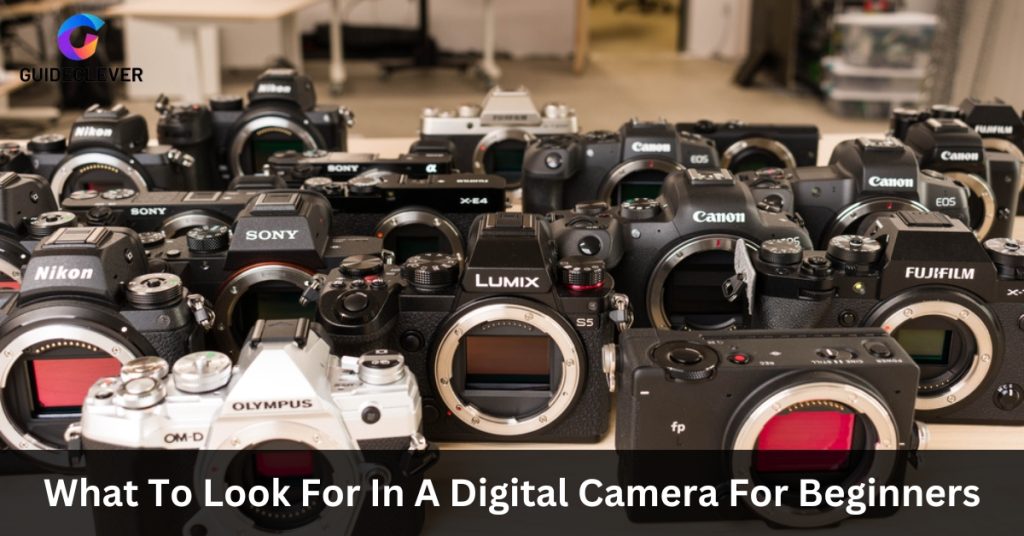
Sensor Size:
Sensor size is an important factor when choosing a camera. The more information the camera sensor can catch, the higher the image quality you will receive. It’s crucial to remember the sensor size impacts the size and cost of the camera.
High ISO:
High ISO allows for better image quality in low-light situations. Look for a high ISO range camera, as it will allow you to take better photos in lit environments.
Megapixels:
Megapixels refer to the amount of detail a camera can capture. Look for at least 24 megapixels for good image quality.
Autofocus System:
Autofocus is important for capturing sharp images. Choose a camera with sophisticated focusing technology to capture the finest possible images.
Image Stabilization:
A function called image stabilization helps to lessen camera shaking and fuzzy pictures. Invest in an image-stabilizing camera to get clear pictures even while using a hand-held lens.
Video Recording Capabilities:
If you plan on shooting videos with your camera, look for one with 4K resolution and a fast frame rate.
Lenses:
A good camera should have an interchangeable lens system to use different lenses for different shooting styles. Look for a camera that offers a wide selection of lenses.
Now we will detail what to consider while choosing a digital camera for beginners:
What Are The Factors To Consider When Choosing A Digital Camera For Beginners?
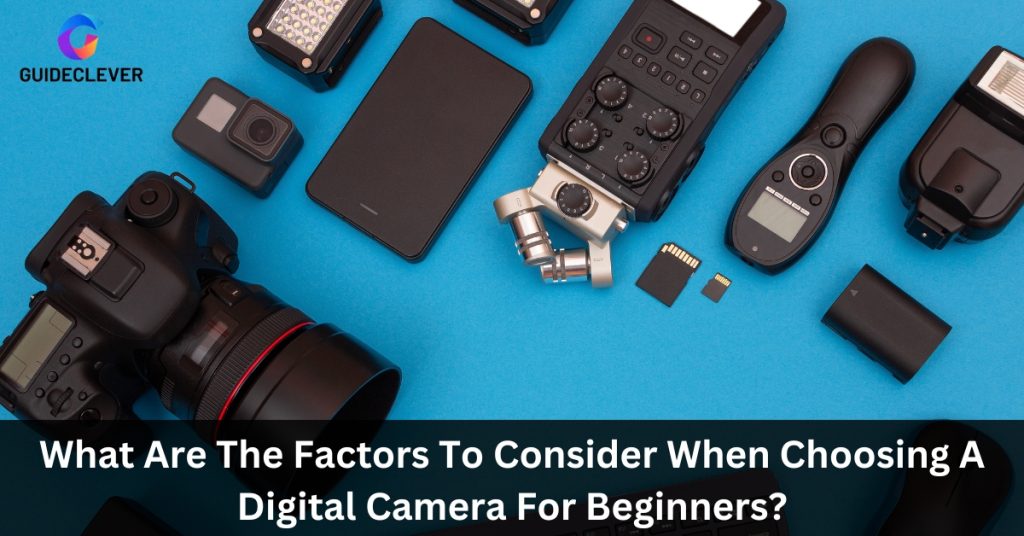
Budget:
Your budget should also consider when choosing a digital camera for beginners. Look for a camera within your budget while still providing your needed features.
Needs:
What you want to use the camera for is the first item to take into account. If you plan on taking photos of wildlife or landscapes, look for a camera with higher megapixels and good zoom capabilities. If you plan on taking videos, look for one with 4K video recording and an adjustable frame rate.
Skill Level:
Your skill level should also take into consideration. If you’re just getting started, search for a camera with an easy-to-use UI. If you are more experienced, you may want to consider investing in a camera with professional features.
Manual Setting:
Finally, if you plan on using manual settings to control the camera, look for one that offers manual controls so you can get the most out of your camera.
Versatility:
Look for a camera that may be utilized in a variety of settings. Some cameras have panning, tilt-shift, and HDR features that can help you take beautiful photos.
Interchangeable Lenses:
Look for a camera that has an interchangeable lens system so you can use different lenses to get the most out of your camera.
Ease Of Use:
Finally, make sure the camera is easy to use. Look for a digital camera with an intuitive user interface and simple controls to get the most out of your camera.
When selecting a digital camera for beginners, there are a few factors to take into account. As for what you want to use it for, it’s important to consider your budget, your skill level, and the features that are important to you.
So now let’s know what questions are asked about digital cameras for beginners.
FAQs
What Is The Best Camera For A Beginner?
The best camera for a beginner depends on your needs and budget. Look for a camera with good image quality, an autofocus system, 4K video recording, and an interchangeable lens system.
What Is The Easiest Camera To Use?
The easiest cameras to use usually have an intuitive, interface and simplified controls. Choose a camera is simple to operate and comprehend.
What Is A Good Starter Camera?
A good starter camera should have good image quality and an autofocus system. A 4K video recording feature and an adjustable lens system should also be included. Look for a camera within your budget and with the features you need.
Is Canon Or Nikon Better For Beginners?
Both Canon and Nikon offer great cameras for beginners. Find a camera that has the required features and is within your price range. Both brands have a wide selection of cameras to choose from.
Now let’s know some latest things about digital cameras for beginners:
Final Words | Best Digital Cameras For Beginners
Finding the right best digital cameras for beginners doesn’t have to be daunting. Consider your needs, skill level, and budget when choosing the right camera. Ensure you look for a camera with good image quality, an autofocus system, 4K video recording, and an interchangeable lens system. You can choose the ideal digital camera that won’t break the budget by keeping these things in mind. Happy shooting!


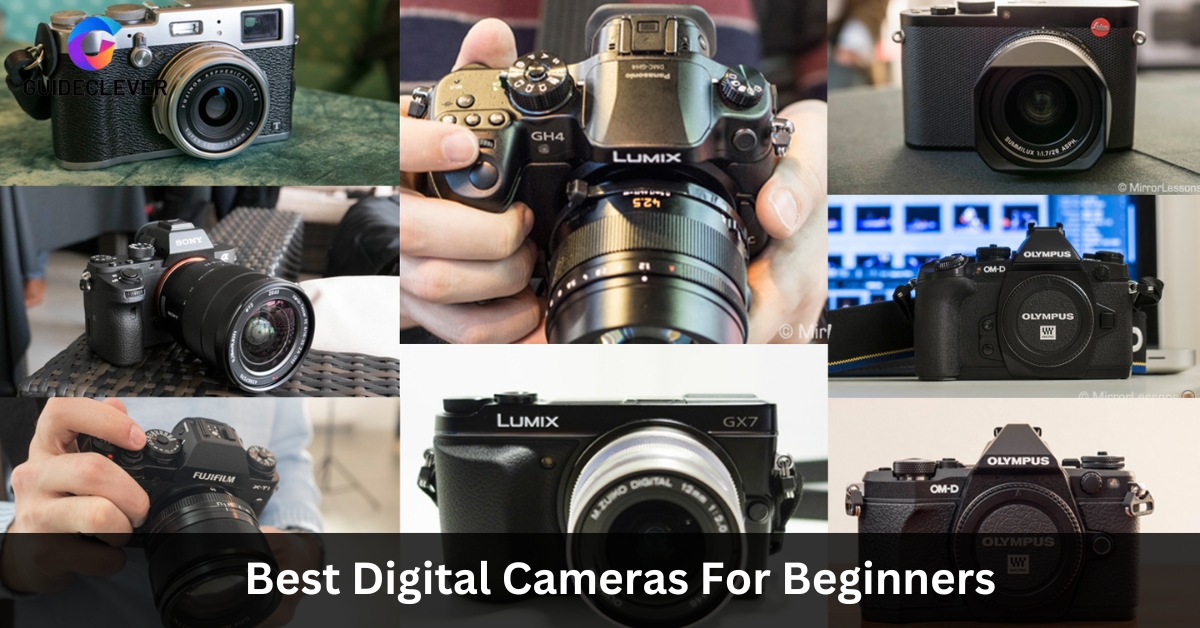
2 thoughts on “Best Digital Cameras For Beginners [Top 6 Picks 2023]”